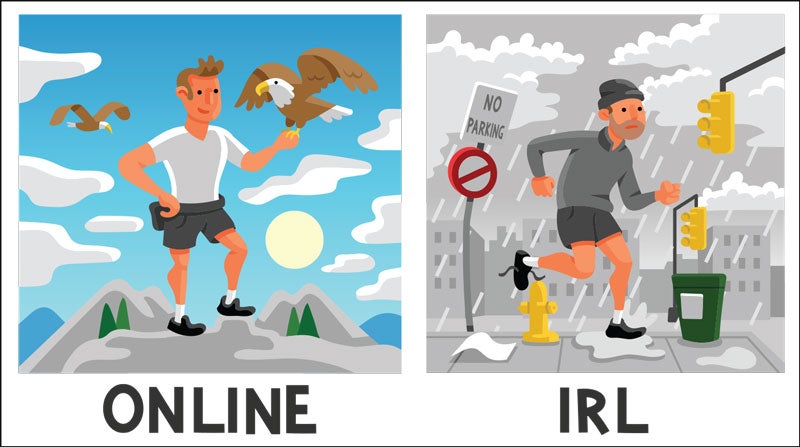Why Your Online Friends Make You Feel Terrible!

Ever wonder why you leave a Facebook binge feeling worse about yourself than before? Dr. Simon Marshall and Lesley Paterson explain the phenomenon in their new book, The Brave Athlete. Read the excerpt below.
What is it about social media that causes such strong reactions within us? Well, a lot of it has to do with impression management and how we perceive the lives of others.
Impression management refers to conscious and subconscious attempts to influence the perceptions of other people about an object or thing (in this case, you) by regulating and controlling information during social interaction. Impression management is often compared to running your own broadcast channel that tries to tell the world how attractive, awesome, athletic and smart you are, among other things.
However, impression management isn’t necessarily pretense; it’s just “selective nondisclosure”—because you will leave out certain, ahem, details so that you are portrayed in a way that is consistent with how you see (or want to see) yourself. For most athletes, this is fast, fit, competent, smart, exciting, fun and shaggable, which may be a frequent departure from how you feel in real life (IRL).
When you’re on the receiving end of someone else’s in-your-face impression management, it’s annoying precisely because you’re on the opposing team. Shrinks call this a self-evaluation threat. It sends the message that their social standing is higher than yours because they’re fitter, leaner, faster, grittier, happier (need we go on?) than you.
And it’s f*cking irritating.
Sometimes it’s really overt, such as someone telling you literally how great they are. Sometimes it’s less overt but still noticeable—when a person’s anecdotes are only about how they saved the day or were proved right. At other times, impression management can also be really subtle, as in when and where people “check in” on Facebook. Some people prefer to reverse engineer the process entirely by faking inadequacy, in order to fish for compliments or to create a personal handicap, portraying themselves as deficient in order to catch opponents off-guard and gain an advantage.
The one thing we know for certain about impression management is that we all do it—at least to some degree. And make no bones about it: It’s a performance in every sense of the word.
We now snort, inject, and inhale impression management.
Technology has taken a lot of the effort out of impression management by helping us broadcast truthiness about our abilities and all-around awesomeness. Social media is a particularly grand stage for your performance because an audience is guaranteed if you have an account. With the click of a button, you can instantly pebble-dash your social network with photos, updates, check-ins, plans, trips, experiences and mood states—the golden currency of impression management. Strava has built an entire business around athletes’ psychological need to compare themselves to others, and there is ample evidence that no segment of road is too ridiculous for some cyclist, somewhere, to want to claim victory as the fastest person across it. If you want to induce a mild panic attack in Stravaholics, just send them an e-mail with the subject heading: “Uh oh, someone just took your KOM.”
This excerpt is adapted from The Brave Athlete by Dr. Simon Marshall and Lesley Paterson. Their cutting-edge brain training guide solves the 13 most common mental conundrums athletes face in their everyday training and in races. With The Brave Athlete, you can solve these problems to become mentally strong and make your brain your most powerful asset.
[velopress cta=”See more!” align=”center” title=”More from the Book”]